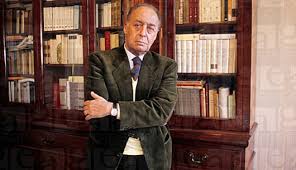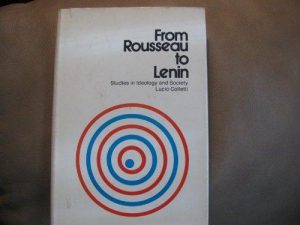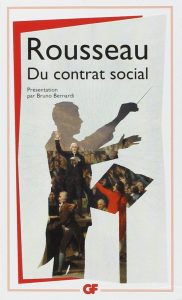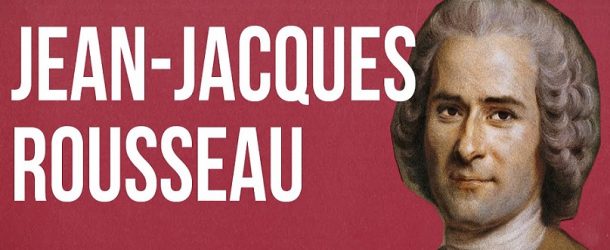Doubtlessly Genevan thinker Jean Jacques Rousseau (1712-1778)[1] is one the most important names of philosophy who gave inspiration to many other important thinkers including famous Karl Marx. Rousseau is often accepted as the leading thinker of the French Revolution and is known with his masterpieces The Social Contract (Du Contrat Social), Emile and Confessions (Les Confessions). Rousseau is unique in many terms and a lot of researches had been made to clarify his thoughts that seem sometimes conflicting with each other. Lucio Colletti (1924-2001)[2] was a famous Marxist Italian Professor of Philosophy who made many important researches analyzing links and relations between different philosophers and Rousseau. In this paper, I am going to analyze Colletti’s article “Rousseau as Critic of Civil Society” from his book From Rousseau to Lenin (Studies in Ideology and Society)[3].

Lucio Colletti
Colletti begins by stating two aims of his article; to give an account of Rousseau’s works and to provide an interpretative sketch of Rousseau to the problem of modern civil society. In order to show the importance of Rousseau, Colletti reminds us that many revolutionary and anti-imperialist leaders of Asia and Africa even the famous Fidel Castro of Cuba were heavily affected by Rousseau and Cuban revolutionaries were carrying Rousseau’s Du Contract Social in their pockets when they were making revolutions (Colletti: 143-144). Colletti continues by stating Rousseau’s thoughts on morality and politics and claims that according to Rousseau, political task is to achieve the transformation of society from “evil” to “good”. In Rousseau’s thought, the evil gets out from social injustices and politics can be a solution to this problem. He thinks that politics founds morals and prevails over spirituality. He also adds that evil derives from society not from God. He rejects the idea of “original sin” and thus subverts the very basis of secular Christianity (Colletti: 144). That is why, he was accused and severely criticized by the Archbishop of Paris. The writer also mentions that placing the evil on society instead of God or individual is a radical change for the philosophy of 18th century. “He created, as it were, a new subject of responsibility, of imputability. This subject is not individual man, but human society” (Colletti: 145). This understanding orientates him to the idea of revolution because the evil which derives from society could only be destroyed by the total cure of the society by itself. In Rousseau’s understanding, freedom is not individual, but rather societal so, humans will only be free when they liberate their society. In other words, freedom of individual lies in the freedom of society. Colletti further claims that Rousseau’s ideas which transform the problem of evil into a critic of society are totally new and revolutionary for their epoch. As a consequence of these views, Rousseau believes that salvation can only be acquired through politics (he means through revolution) not by faith, religion.

From Rousseau to Lenin[4]
Rousseau’s thoughts are also very different from his contemporary famous philosophers called Encyclopedists. Encyclopedists like Voltaire, D’Alembert and Diderot saw the only problem of society as its mistake in organization. However, Rousseau thinks that the problem of society is based on a tricky contract made between people to end the state of nature period centuries ago. Colletti makes comparisons between different state of nature ideas of philosophers and that of Rousseau. For example, Thomas Hobbes thought that humans are selfish and power-seeking creatures from birth and the state of nature soon turned into the state of war in which “all was against all”. In order to end this chaotic situation, people came together and made a contract to unify their power and to give it to a absolute monarch called “Leviathan”. In contrary, for John Locke the state of nature was a very peaceful process, like a state of innocence but in order to guarantee the continuation of this situation people came together and made a contract to form a state that will be responsible of their governance, security of their lives and their private properties. Rousseau’s state of nature conception is much more different than Locke and Hobbes’ conceptions. Rousseau thinks that “the state of nature is not a moral condition but a state of innocence, purely animal condition, beyond the distinction between good and evil” (Colletti: 150). So, for Rousseau a man in the state of nature is not a man but rather a natural being who lacks socialization. He does not know how to thing, how to act, how to create relationships with his own kind but only possess some basic instincts. In other words, natural man is only “potentially man”. It is also discussable that whether Rousseau thinks of the state of nature as a hypothetical situation, thought experiment or a real historical period. Let us now look at how this tricky contract, this unfortunate event that would disrupt all human relationships, society took place?

Du Contrat Social[5]
According to Rousseau, the establishment of this tricky contract took place in four steps. In the first phase, men who live in isolation as parts of nature began to associate, to collaborate and to create a degree of provisional order. In the second phase, men made a technical progress and began to build shelters, houses for themselves. Families were formed and patriarchal period started. The socialization of men developed rapidly. In the third phase, men totally lost their state of nature characteristics and dealt with labor and thoughts. Due to their use of reason, men created language and developed their relationships. Men also discovered “division of labor” which would help them to pass from “subsistence economy” to the “economy of productive development”. They also dealt with metallurgy and agriculture. Rousseau said “It was iron and corn which first civilized men, and ruined humanity” (Colletti: 153). Due to this productive economy, surplus occurred and private property understanding began to settle in men’s mind. In the fourth and the last phase, in order to keep their wealth, private properties men came together and made a social contract. However, this contract was an iniquitous, unfair one because it legalized social injustices which are sources of evil for Rousseau. This legalized inequality was not derived from natural differences between men but rather from their wealth proportions. Rousseau always claimed that although men have inequalities from birth (some are born stronger, some are wiser), these differences are very small and derive from the nature. However, injustices that were legalized in the tricky social contract were only based on money, wealth and there was a huge gap between rich and poor. Adam Smith also thinks like Rousseau in this subject and for showing evidence he says “A much greater uniformity of character is to be observed among savages than among Civilized nations” (Colletti: 155). Up to this point, Rousseau and Smith share similar views. However, Smith thinks that division of labor is a good thing because it will increase productivity. Although increase in the production will also increase the gap between rich and poor, it is still a good thing because “the benefit will become general”. In other words, when a country develops and gets wealthier, everybody will gain from this situation. However, for Rousseau, one man’s wealth arises directly from the impoverishment of another and that is why division of labor only favors rich people. Marx also makes contribution to this topic and asserts that the benefit should be measured by relative gains not by absolute gains. So, Rousseau explains in this way why the social contract was tricky and how the corrupt, deceitful man of modern civil society was born. “… the origin of society and law, which bound new fetters on the poor, and gave new powers to rich; which irretrievably destroyed national liberty, eternally fixed the law of property and inequality, converted clever usurpation into unalterable right, and, for the advantage of a few ambitious individuals, subjected all mankind to perpetual labor, slavery and wickedness” (Colletti: 165).
Another controversial issue about Rousseau is that whether he invited society to savagery or not. Although Voltaire said “He wants to walk on four legs” about him in my opinion the basic motive of Rousseau for defending the natural and primitive life was not that simple. Rousseau wanted to go back to natural and savage life because he thought that in order to demolish this corrupt society legalized by the tricky contract, we should go back to the conditions of the state of nature and to make a new and fair contract. In addition, Rousseau believed that as long as you live in this corrupt society you will be corrupted too. That is why, he said “Man is born free and is everywhere in chains”. Society corrupts us day by day by using many institutions like schools, public offices and the only way to escape from it, is to live in isolation, in the nature. Rousseau wrote Emile with these ideas and advised people to educate their children themselves in the nature not by sending them to schools where they will slow by slow begin to be corrupted.
Rousseau also criticizes the British parliamentary system of his time. He said; “The people of England regards itself as free; but it is grossly mistaken; it is free only during the election of members of parliament. As soon as they are elected, slavery overtakes it, and it is nothing” (Colletti: 183). Rousseau believed that the just government should just be a “commission” that will govern the society according to general will. Here, we should discuss Rousseau’s views in more detail. I think that Rousseau understood that the parliamentary system was a failure (still a failure for many people) for society in its efforts to govern itself. Rousseau saw that this separation between the government and the society will always result in the torn of society and executive power. So, in order to prevent this, the only way that seems possible is to use direct democracy in which all people will be active in executive process. But how we can apply direct democracy for countries having millions of population? So, Rousseau favored a commission that will be just responsible of putting into action the decisions of the general will. I guess we can discuss the internal structure of communist parties here. Politburo was also thought to be a commission of the Communist party which represented the Russian proletarian society. However, starting from the 1930s, the Politburo began to act like the sole decision-maker and the General Secretary of the Communist Party -who was Stalin at those years- started to act like a dictator. From Rousseau’s perspective, this shows that 1917 Bolshevik revolution led by Lenin did not achieve to make a fair contract between Russian people and to save people from their deceitfulness at least not Stalin.
We can further discuss how people can make a new, fair contract after a revolution because all people making the revolution lived in the “precontract” period too and they were corrupted by the society. Then, I think it would not be irrational to assert that corruption will appear again after the just contract and the society would soon transform into its ex-condition. So, I think that from Rousseau’s perspective, to restart again from the beginning, from zero is only possible when everything related to the previous regime were destroyed. This will lead us to anarchism (also to nihilism up to some degree) but still does not completely solve the problem. Because even all things related to previously system were destroyed, there would be still people left from the ancien regime. So, I guess for Rousseau it would be possible only if people who were able not to be corrupted in the ancien régime by living in isolation and in the nature would be alive after the revolution. In this case, people would have chance to start from the beginning, to establish a better world.
I think Colletti is right in saying that Marx and Lenin added few things to the ideas of Rousseau because when we analyze Rousseau, we see how he was close to form a comprehensive and consistent theory like Marxism. Rousseau was a great man who saw the negative development of modern society with increasing importance of wealth, spoiled human relationships and Enlightenment ideas that force humans to work like they were racing with everybody else. Developments in sciences (primarily in medicine) are good things but only if they are used for the sake of humans. Nobody could deny that the myth of progress and this commercial and competitive understanding of Enlightenment dragged our civilization to imperialism, to wars, to the emergence of atomic bomb in addition to many good things.
Assist. Prof. Dr. Ozan ÖRMECİ
[1] http://www.iep.utm.edu/rousseau/.
[2] https://en.wikipedia.org/wiki/Lucio_Colletti.
[3] Available here; https://thecharnelhouse.org/wp-content/uploads/2016/02/lucio-colletti-from-rousseau-to-lenin-studies-in-ideology-and-society1.pdf.
[4] Available at Amazon.com; https://www.amazon.com/Rousseau-Lenin-Lucio-Colletti/dp/0853453500.
[5] Available at Amazon.com; https://www.amazon.com/Contrat-Social-French-Jean-Jacques-Rousseau/dp/2081275236.

























































